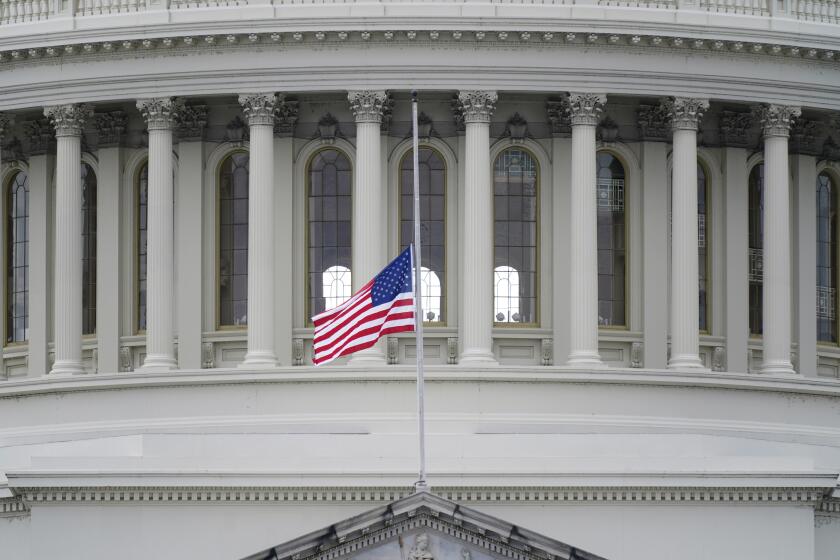Opinion: Senate Republicans are as much on trial as Trump

- Share via
As former President Trump’s second impeachment trial gets underway in the Senate on Tuesday, the nation’s attention is, once again, drawn to a man who craves it like a drug.
But the focus really ought to be on the members of the Senate, on us as a nation, and on whether we are capable of using the tools the Constitution set out to protect the democracy from a president — any president — who abuses the power granted by the people to serve his own interests.
The impeachment trial is about what Trump did with that presidential authority, but it also offers yet another chance for the mechanisms of democracy to do what they are supposed to — check and balance.
Even if Trump had said nothing on Jan. 6., his conduct after his election defeat to Joe Biden was outrageous and, yes, impeachable.
Trump was impeached by the House for, in essence, fanning the flames of discontent by attacking the legitimacy of an election he lost, and encouraging his backers to descend on Washington, D.C., to disrupt the certification of the electoral college vote.
That’s not a policy dispute. That’s not the regular machinations of politics, no matter how cynical it can get. And Trump’s incitement conflicted with a fundamental element of a mature democracy: the peaceful transfer of political power.
It was thuggery. It was an attempted coup, a failed effort to use the might of a mob to stop the confirmation of election results.
Our infamous red-blue divide has moved far beyond our different views about the role of government and into the realm of self-identity, race, regional differences and financial status.
Trump exploited that divide by positioning himself as the leader of people who feel the country is changing in ways they don’t like. It is the politics of resentment, interspersed with delusion. And even with Trump back among the ranks of everyday citizens, the politics he exploited remain potent.
Yet, this impeachment should not be an issue of party politics and party loyalty. This should be about what we are as a democracy, and whether our vaunted constitutional safeguards are worth the paper they were inscribed upon.
Unfortunately, the outcome of the Senate trial seems to be a foregone conclusion. The necessity of holding a rogue president accountable for his abuses is being overwhelmed by Republican senators’ fear of their own electorates — members of which heeded their president’s call to action and physically invaded the Capitol five weeks ago — and by a poisonous embrace of party loyalty ahead of political responsibility.
Fortunately, Trump’s failure to win reelection — and he did lose an election that was not, to use his word, rigged — was an example of how the mechanisms of democracy are supposed to work.
Virginia becomes the first of the secessionist states to end a practice with deep roots in slavery and racism. Good for Virginia.
The nation saw who and what Trump was as a president and rejected him not only in the nonbinding national popular vote (which he also lost four years ago), but in the electoral college, the only vote that really matters.
But as Trump’s second impeachment trial proceeds and Senate Republicans once again close ranks to protect him, we seem fated to watch part of the checks-and-balances regime fail.
Interestingly, the reason for its failure will echo the excesses Trump indulged in to spark the two impeachments in the first place — a failure by too many senators to understand the responsibilities of the offices to which they have been elected, and a failure to live up to the oath they took to “bear true faith and allegiance” and “support and defend the Constitution of the United States against all enemies, foreign and domestic.”
More to Read
A cure for the common opinion
Get thought-provoking perspectives with our weekly newsletter.
You may occasionally receive promotional content from the Los Angeles Times.













